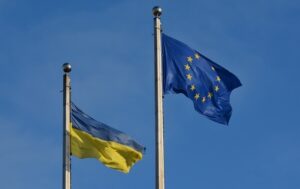
The European Commission has confirmed the disbursement of the fifth tranche of emergency macro-financial assistance (MFA) to Ukraine in the amount of €1 billion under the ERA, which will be repaid from frozen Russian state assets.
“This further strengthens the EU’s role as Ukraine’s largest donor since the start of Russia’s aggressive war, with total support approaching €150 billion,” the European Commission said on Friday.
It is specified that the total MFA amounts to EUR 18.1 billion and is the EU’s contribution to the G7 Emergency Revenue Acceleration (ERA) initiative, which aims to provide Ukraine with financial support of approximately EUR 45 billion.
“These loans are to be repaid from the proceeds of Russian state assets frozen in the EU. With this latest payment, the total amount of Commission loans to Ukraine under this MFA will reach EUR 7 billion from the beginning of 2025,” the EC said.
The press release also recalls that “as agreed by European leaders at the Special European Council in early March and confirmed by President Ursula von der Leyen, the Commission stands ready to allocate the EU’s contribution to the ERA loan initiative if necessary.”
“It is in close contact with the Ukrainian authorities on the next disbursements. If Ukraine submits a request, the Commission is ready to respond quickly. This will allow the EU to support any significant increase in military spending in the coming weeks and months, helping to ensure that Ukraine is in a strong position ahead of any potential peace talks,” the press release emphasizes.
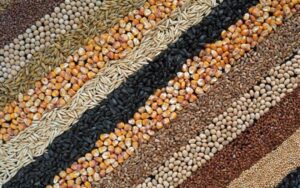
Today, June 12, the Council of the European Union recognized the equivalence of Ukrainian standards for the production of beet, sunflower, rapeseed, and soybean seeds with European requirements, according to the press service of the Council of the EU.
According to this decision, seeds of these crops produced in Ukraine will be able to enter the EU market. This means that EU-based companies will be able to diversify their seed production areas. The new rules will also help to maintain a continuous supply of high-quality seeds to the EU.
“The decision grants equivalence to beet, sunflower, turnip, and soybean seeds produced and certified in Ukraine, fodder plant seeds produced in the Republic of Moldova and officially certified by its authorities, as well as to the corresponding field inspections carried out. The equivalence confirms that the national procedures of the two countries offer the same guarantees regarding seed characteristics and rules for seed examination, identification, and control as those applicable to seeds harvested in the EU,” the statement said.
Moldova has received similar permission for fodder plant seeds.
The decision will enter into force 20 days after its publication in the Official Journal of the EU.
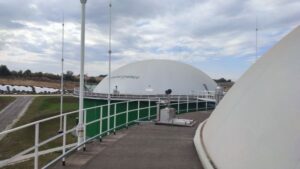
The Vitagro group of companies, which already has one biomethane plant with an annual capacity of 3 million cubic meters in the Khmelnytskyi region, intends to build two or three more such plants in a year and a half, each costing EUR6-6.5 million, according to the company’s director of development and investment, Serhii Savchuk.
“We plan to build two or three more plants with a capacity of 3 million cubic meters each. We estimate the cost of one plant at EUR 6-6.5 million. We will need about 1.5 years to do this,” Savchuk said in a comment to EnergoReform on the sidelines of the Solar Agro Conference organized by the Solar Energy Association of Ukraine.
He did not specify the details of biomethane exports from the first plant, noting that after a test delivery in February, “everything the plant produces is sold to a number of countries, including Germany and the UK, at market prices.”
During his speech at the conference, he suggested that the company may work with Ukrainian banks to expand its biomethane capacity.
“Today, our plant with a capacity of 3 million cubic meters of biomethane, which is produced from manure from our livestock complexes, is fully operational. We will build a pipeline, Ukrgasbank is here, you can pay attention to us,” he said to conference participant Mykola Alferov, deputy director of the SME Department at UGB.
Savchuk also noted that during the war, the group launched a bioethanol plant in the Ternopil region by reconstructing an alcohol plant it privatized at the end of 2022, which cost EUR20 million.
“We invested EUR 20 million, completely re-equipped the distillery, and now have 25,000 tons of bioethanol for export from the processing of 85,000 tons of corn,” explained the director of development and investment at Vitagro.
In a comment to Energorforma, Savchuk expressed hope that cooperation will eventually be established for the sale of bioethanol to fuel companies in Ukraine, which from May 1 must sell gasoline containing at least 5% of this substance, but do not mix the product here, instead importing it ready-made from Europe.
He also shared his experience of installing SES groups on farms for their own consumption, which he called “an absolutely effective investment.”
“Seven solar stations for our own consumption were installed in a few months, and we have developed an appetite for a second phase, so we want to launch separate complexes both on the roof and on the side. This is economics, this is ecology, this is the ESG (Environmental, Social, and Governance) trend, which is very relevant. We are a good example for the development of SES for our own consumption, and in the future there will be energy storage,” Savchuk said about Vitagro’s plans.
As reported in February 2025, Vitagro announced its intention to reach the planned annual capacity of the biomethane plant of 3 million cubic meters in 2025 and, if exports are successful, to build two more plants (in the Khmelnytskyi and Rivne regions) to increase production and exports.
At that time, it was indicated that the group of companies was considering the option of attracting foreign investors to its capital.
The company expected that the EUR6 million invested in the construction of the first biomethane plant in the Khmelnytskyi region would pay off in five years, but if the market continued to grow, it would pay off sooner. The company’s cost price for biomethane was stated at over EUR 500 per 1,000 cubic meters.
In February, the chairman of the board of the Bioenergy Association of Ukraine, Georgy Geletukha, noted that the average price of biomethane for export to Europe could be approximately EUR 900 per thousand cubic meters.
Agroholding Vitagro exported its first batch of biomethane in 67,000 cubic meters (destination country – Germany) on February 6, 2025.
The Vitagro group of companies is engaged in the production and processing of agricultural crops, in particular fruits and vegetables, dairy farming, and pig breeding. The group cultivates about 85,000 hectares of land in the Khmelnytskyi, Ternopil, and Rivne regions. In 2022, it acquired the Marylivsky Distillery (Nagirnyanka village, Ternopil region) from Ukrspirt.
According to the Unified State Register of Legal Entities and Individual Entrepreneurs, the ultimate beneficiary of the investment company Vitagro is People’s Deputy Serhiy Labazuk (parliamentary faction “For the Future”).
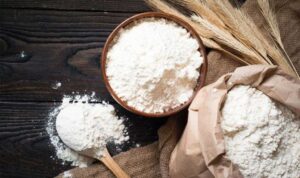
Flour and cereal producers are concerned about a reduction in flour exports to the European Union after the expiry of autonomous trade measures on June 6, as 75% of their exports currently go to the EU, Rodion Rybchinsky, director of the Ukrainian Flour Millers Association, said in an interview with Interfax-Ukraine.
“Starting from June 6, we have the opportunity to supply a total of 583,300 tons of wheat and wheat flour to the EU market by the end of the year. But since the quota is combined, I am not sure that we will be able to fill it. It is much easier for wheat exporters to find buyers in the EU and fill their quota,” he said.
Rybchynsky added that the industry association continues to use all possible communication channels to convey to European officials the need to allocate a separate quota for Ukrainian flour for export to the EU or to remove it altogether.
The head of the Ukrainian Flour Millers Association stated that before the war, there were 678 enterprises specializing in grain processing in Ukraine, but in 2022, 192 enterprises were destroyed and remained in the occupied territories. As of the end of 2024, 88 enterprises have been restored.
At the same time, according to his information, exports of flour and cereals have fallen by 50% since the start of the war. Among the reasons, the expert cited a reduction in production and changes in logistics: whereas exports used to be mainly by sea, since the start of the war they have been forced to switch to road and rail transport, which are more expensive than sea transport.
Due to problems with transporting products across the Black Sea, container shipping has not yet been fully restored. As a result, the geography of grain processing product sales has changed significantly since the beginning of the war: 75% of products are exported to the European market, of which 55% go to EU countries, 15% to the Middle East, 4% to Africa, and 2% to Asia, according to the head of the Ukrainian Flour Millers Association.
As reported, First Deputy Minister of Agrarian Policy and Food Taras Vysotsky said in comments to journalists that one of the government’s strategies in negotiations with the European Commission will be to request that the established quotas be divided by commodity codes.
The European Commission has approved quotas for Ukrainian agricultural products, which will be in effect from June 6 until the end of 2025 as part of the Deep and Comprehensive Free Trade Area (DCFTA) agreement. According to a document published on the EU website, by the end of 2025, Ukraine will be able to supply the EU market under the Deep and Comprehensive Free Trade Area in a 7/12 month mode (7/12) with wheat, flour, and meslin – 583,330 tons , corn – 379,167 thousand tons, barley – 204,167 thousand tons, poultry meat – 52,511 thousand tons, beef – 7 thousand tons, eggs – 3,500 tons, milk and cream – 5,833 tons, dry milk – 2,917 tons, butter – 1,750 tons.
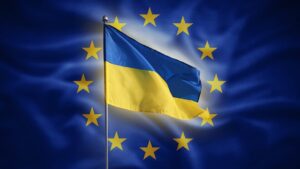
In 2024, Ukraine became one of the three largest exporters of agricultural products to the European Union, according to Eurostat.
According to the published information, the largest share of imports to the EU came from Brazil (8.8%, EUR 17.1 billion), the United Kingdom (8.5%, EUR 16.6 billion), Ukraine (6.7%, EUR 13.1 billion), and the United States (6.1%, EUR 12.0 billion). China (5.1%), Norway (4.7%), and Turkey (4%) were also among the main suppliers of agricultural products to the EU.
The EU’s main partner for agricultural exports in 2024 was the United Kingdom with a share of 23.0% (EUR 54.0 billion), followed by the United States (12.8%; EUR 30.1 billion), Switzerland (5.4%; EUR 12.6 billion) and China (5.3%; EUR 12.3 billion).
Eurostat also noted that in 2024, the EU exported agricultural products worth EUR 234.1 billion and imported EUR 194.9 billion, resulting in a surplus of EUR 39.2 billion. Compared to 2023, both exports and imports increased by 2.8% and 6.7%, respectively.
The volume of trade in agricultural products in the EU between 2014 and 2024 increased by 59%, with exports growing by 58% and imports by 60.2%, equivalent to an average annual growth of 4.7% for exports and 4.8% for imports.
As reported, in 2022, the EU lifted restrictions on Ukrainian imports and introduced a so-called customs visa-free regime. According to European media reports, new rules will come into force on June 6, 2025, with duties and quotas on Ukrainian exports being reinstated. The EU is currently preparing a transitional regime that will limit duty-free agricultural exports, including grain, honey, eggs, sugar, and other products.
The initiator of the changes was Poland, which stated the need to protect European farmers. A number of EU countries supported the tightening of trade conditions with Ukraine.
According to the Ukrainian government’s estimates, the abandonment of the current rules will result in the country losing around EUR 3.5 billion per year.
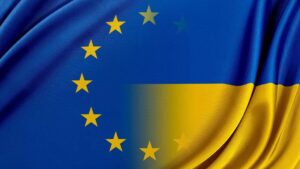
The EU is preparing to impose increased tariffs on Ukrainian imports within a few weeks, which will hit Ukraine’s economy at a crucial moment in its fight against Russian aggression, the Financial Times reported.
According to the publication’s sources, the decision to abruptly terminate special trade agreements that allowed most Ukrainian goods to be imported into the EU duty-free was made after Poland led a movement to protect the bloc’s farmers.
European diplomats said that this transitional proposal, recently sent to EU member states, would sharply reduce duty-free quotas for agricultural products.
Two EU diplomats told the FT that the European Commission’s transitional measure would split the annual duty-free quota into 12 monthly quotas to reduce imports while negotiations continue.
This will have the greatest impact on corn, sugar, honey, and poultry. The corn quota will be reduced from 4.7 million tons to 650,000 tons per year. The quota for poultry will fall from 57,000 tons to 40,000 tons, and for sugar from 109,000 tons to 40,700 tons.
A European Commission representative confirmed that the military agreements will not be reinstated “because we are currently working on revising” the free trade agreement between the EU and Ukraine.
“The Commission is also looking into possible transitional measures in case the talks aren’t finished and aren’t applied by June 6,“ he added.
“This is a really bad signal for Ukraine,” said Bernd Lange, head of the European Parliament’s trade committee, adding that the search for a solution will continue until at least October.
His committee will hear the European Commission’s position on Wednesday on why the promised trade talks have stalled, given that the June deadline was “known for a long time,” Lange said.
According to the publication, the Ukrainian government estimates that a return to pre-war trade conditions would reduce the country’s revenues by approximately EUR 3.5 billion.
“This is a huge step backwards. What we are seeing now is a lack of understanding,” said Mykhailo Bno-Ayriyan, trade representative of the Federation of Employers of Ukraine.
As reported, the EU has a free trade agreement with Ukraine, and after Russia’s invasion of Ukraine in 2022, the EU temporarily suspended customs tariffs on Ukrainian agricultural products. These agreements expire on June 6, and the EU plans to replace them with “transitional measures” while both sides update their joint trade agreement.
The duty-free regime established in 2022 applied to poultry meat, wheat, and sugar from Ukraine, most of which passed through EU countries on their way to Africa and Asia. But farmers and politicians in Poland, France, and other countries have blamed Ukrainian exports for driving down domestic prices. Ahead of the May 18 presidential election, Warsaw asked the European Commission to postpone the highly unpopular trade talks with Kyiv to minimize the chances of nationalist opposition candidate Karol Nawrocki.
Since early 2025, the European Commission has stated its intention to abolish preferential trade in agricultural products for Ukraine. It was expected that trade measures to support Ukraine would be more modest and that imports into the EU would decline.